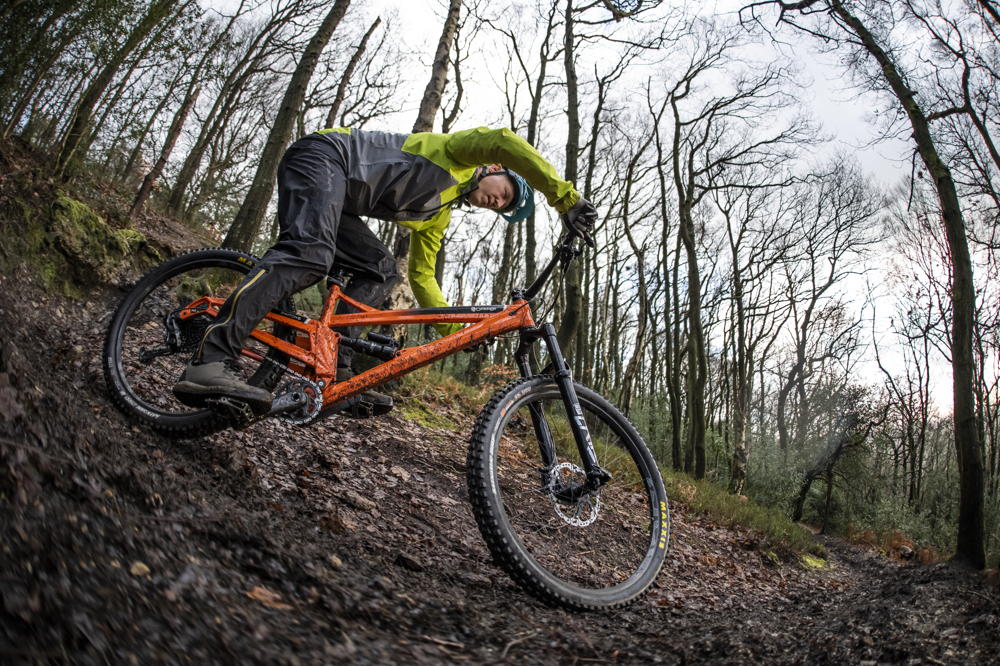A hard-partying all-rounder with a questionable taste in personal aesthetics, but enough about our reviewer...
Orange Switch 6 RS review
This is the brand new Orange Switch 6 trail bike, aka the mullet. As such, it has a 29in front and 27.5in rear wheel. 160mm fork with 145mm rear.
>>> What is the best mountain bike for under £3000?

The wheels are mismatched, but the singletrack is a perfect fit for teh Switch 6
Orange Switch 6 RS need to know
- 29in bike with a 27.5in rear wheel or is that vice versa?
- Long and low geometry with 484mm reach on the size L, combined with a steep 75.8 seat tube angle
- RockShox Lyrik Ultimate fork has 160mm travel and 42mm fork offset
- Revamped cable routing, slimmed down shock mount, hand built in the UK
Mullet? We’re not sure what the reason is for the nickname because surely a mullet is short at the front and long at the back, ask Ian Botham? It probably comes from the American interpretation; business up front, party at the back.

Shock mount neatly accommodated in frame recess
Either way, if you’ve been around mountain bikes for a while you’ll know that having a big front wheel and smaller back one isn’t a new idea; plenty of e-bike companies currently use mismatched wheels and quite a lot of big hitters have dabbled with it in the past including Cannondale, Trek and Specialized. The idea behind this asymmetric design is that you get increased roll-over and stability from the bigger front wheel combined with the manoeuvrability and tighter turning of the smaller rear wheel.

Shock now sits slightly further up the down tube
For Orange, the Switch 6 also plugs a gap in the range between the Orange Stage 6 and Orange Alpine 6, which have 29in and 27.5in wheels respectively, but there are residual benefits too – a 27.5in rear wheel is stiffer and stronger than a 29in wheel and it also offers greater tyre/mud clearance. It also resolves a clearance issue, which we encountered first hand on the Stage 5 a couple of years ago, where the tyre would hit the back of the seat tube. At the time Orange’s solution was to reduce the rear travel, and one of the Stage 5 bikes we tested actually had less than 120mm of rear travel.

Switched on: Orange has exploited the mullet niche
Thankfully, there’s no such compromise with the Switch 6, although since the launch late last year there have been different figures quoted for the rear travel from 145mm to 160mm, so we measured it. Vertical wheel travel on the Switch 6 we tested here we measured as 142mm, and it will be touch more along the curved axle path.

29in wheel leads the charge…
To bring the bike in-line with its two stablemates Orange has also updated the geometry and the most notable figure is the increase in reach, which on the large is 484mm. The Switch 6 also gets a steeper 75.8 degree seat tube and longer chainstays, which really helps reduce front wheel lift when climbing steep ascents. The steeper seat tube did mean Orange had to do a bit of repackaging – the metric rear shock now sits further forward on the down tube, and to make room for its 230mm eye-to-eye length, there’s even a little recess for the end of the shock mount.

… 27.5in wheel bings the noise
Switching to a smaller rear wheel also meant Orange had to rejig the pivot position, which is slightly further forward, but the suspension is every bit as Orange as previous bikes. The frame itself is not radically new, but Orange has made subtle tweaks to the tube profiles and cable routing – the rear brake hose now goes underneath the swingarm before entering the chainstay.
There are four Switch 6 versions with this RS spec sitting one up from the entry level model. It still gets a top-end build however, with the mix of SRAM GX and XO Eagle components, the superb RockShox Lyrik Ultimate fork and Super Deluxe Ultimate rear shock, Fox dropper post, E13 rims and snappy Shimano XT Trail disc brakes. Orange fits a grippy Maxxis Minion DHF 3C tyre on the front and a hardwearing, faster-rolling DHR II on the rear. These spec choices are good but Orange know UK riders are fussy so it offers several upgrade options via its website.

Orange Switch 6 RS review
In theory, having a smaller rear wheel should make the Switch 6 more manoeuvrable but also a little bit choppy as the bike doesn’t roll over bumps as well as a pure 29er. On the trail however, there’s only a very subtle difference between the Stage 6 (29in wheels at both ends) and Switch 6, but it is noticeable. The latter is a little easier to lay over in turns but it doesn’t quite have the Stage 6’s confidence and stability when straight-lining the roughest descents.
To focus on the wheels size however, is to do the Switch 6 a disservice, because there’s more to this bike than the smaller rear wheel. With the revamped geometry, the Switch 6 is well balanced, and as such you can ride it that much harder. It’s also light, stiff and comes fitted with one of the best forks currently available. It’s easy to set up and stacks of fun to ride, so you can take dispense with business quickly and get on with partying. Again, just like Ian Botham.
So although the mullet is only a haircut favoured by riders from a certain antipodean descent, as a mis-matched wheel size the concept has a lot going for it and should have a more universal appeal. In fact, we reckon it’ll be so popular we’re expecting to see an Orange Switch 5 before the year is out.
















